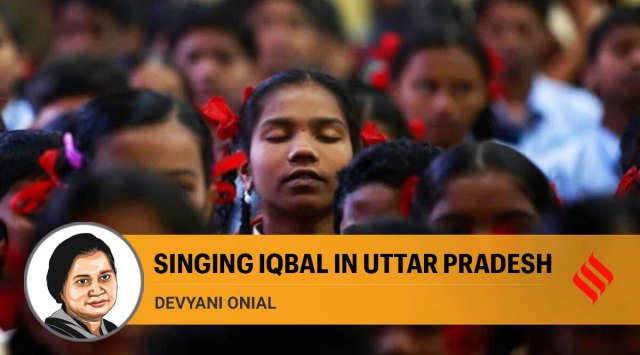
Growing up in the ’80s, school assemblies were not merely congregations one rushed to and was invariably late for. In the residential school I attended in Dehradun, they were different things on different days. Some days, there were songs and prayers so slow that they lulled you into lethargy rather than set you marching to a new day. And then there were days when our music teacher and accomplished vocalist, Mr Deshpande, led the assembly with his sonorous voice and sparkling repertoire. It had room for everything from Kabir’s introspective “Moko kahan tu dhunde re bande main toh tere paas mein” and “Haman hain ishq mastana” to Muhammad Iqbal’s “Aa ghariyat ke parde” from his “Naya Shivala” to the poem that has caused the principal of a government school and a shiksha mitra to be booked in Bareilly on a complaint by the VHP of hurting religious sentiments after the video of children singing it in a school assembly went viral.
“Lab pe aati hai dua ban ke tamanna meri“, written by Iqbal in 1902 — also known as “Bachche ki Dua” — has been sung routinely in schools in India and Pakistan. Generations have recited it in school assemblies, remembered it long after one’s school days were over and hummed it years later alone or with school friends. The tune and the lines linger on, sometimes half-forgotten, sometimes fully-remembered. The use of one of the prayer’s stanzas, picturised on school children in Pakistan in “Ae watan, watan mere, aabad rahe tu“, a warm ode by Gulzar to one’s country, one’s roots, from the 2018 spy thriller Raazi, only reiterated what one always knew: It does well as a child’s heart-felt prayer for light and cheer, one that upholds universal values.
Said to be inspired by an English poem, “A Child’s Prayer” by Matilda B Edwards, “Bachche ki Dua”, expresses sentiments that no one can take, or should take, objection to. It talks about a child’s wish for a life like a candle (shama), that banishes darkness from the world (door duniya ka mere dum se andhera ho jaye) and brings light to all corners (har jagah mere chamakne se ujala ho jai). It talks about protecting the poor (garibon ki himayat karna) and loving the weak (dard mandon se zaifon se mohabbat karna).
So, it is presumably the use of “Allah” in the line “Mere Allah burai se bachana mujhko” (God save me from all wrong doing) that has led to the uproar of hurt sentiments. No one seems to have nurtured such hurt till 2019, when the headmaster of a government school in Pilibhit was suspended following a complaint by VHP workers that students were being made to recite a prayer usually said in madrasas. Before this, no one who had sung it had thought of it as a religious prayer. Children who followed faiths other than Islam neither paused nor stopped at the word “Allah”; everyone sang along, praying to God, asking him to keep us on the right path (nek jo raah ho us raah pe chalana mujhko). But in times when Urdu, the language, has become Muslim and the colour orange Hindu, what chance does a line like that have in an orange-lit India?
Quoted extensively, Iqbal, like his poem-in-the-middle-of-a storm, has evoked much mistrust in India after Independence. An advocate for a homeland for Muslims, who was later anointed the national poet of Pakistan (he died before Pakistan was created), he left behind an exhaustive body of work that straddled the East and the West, modernity and tradition, and weaved together political and philosophical strands. He was also the poet who wrote lyrically on Lord Ram, calling him “Imam-e-Hind” and on Guru Nanak, whom he called “Mard-e-kamil” (a complete man).
But perhaps, it is from another of Iqbal’s songs written for children, that New India can take an old lesson. Written in 1904, “Saare jahan se accha” continues to enjoy an uninterrupted run as India’s unofficial anthem, sung gustily in schools at Independence Day and marched to by the Indian army. The “Tarana-e-Hindi” (anthem of India) is dotted with images that evoke an unchanged India with the Himalayas as its sentinel and the Ganga, on whose banks once descended a caravan. It also holds a message that’s a cliche and, like all cliches, repeats a truth: “Mazhab nahin sikhata aapas mein bair rakhna/ Hindi hain ham vatan hai Hindostan hamara” (Religion doesn’t promote enmity/ We are all Indians and India is ours). Let’s hope no one objects to that someday.